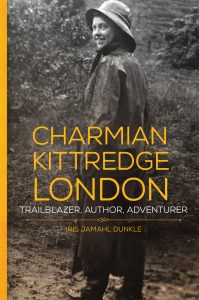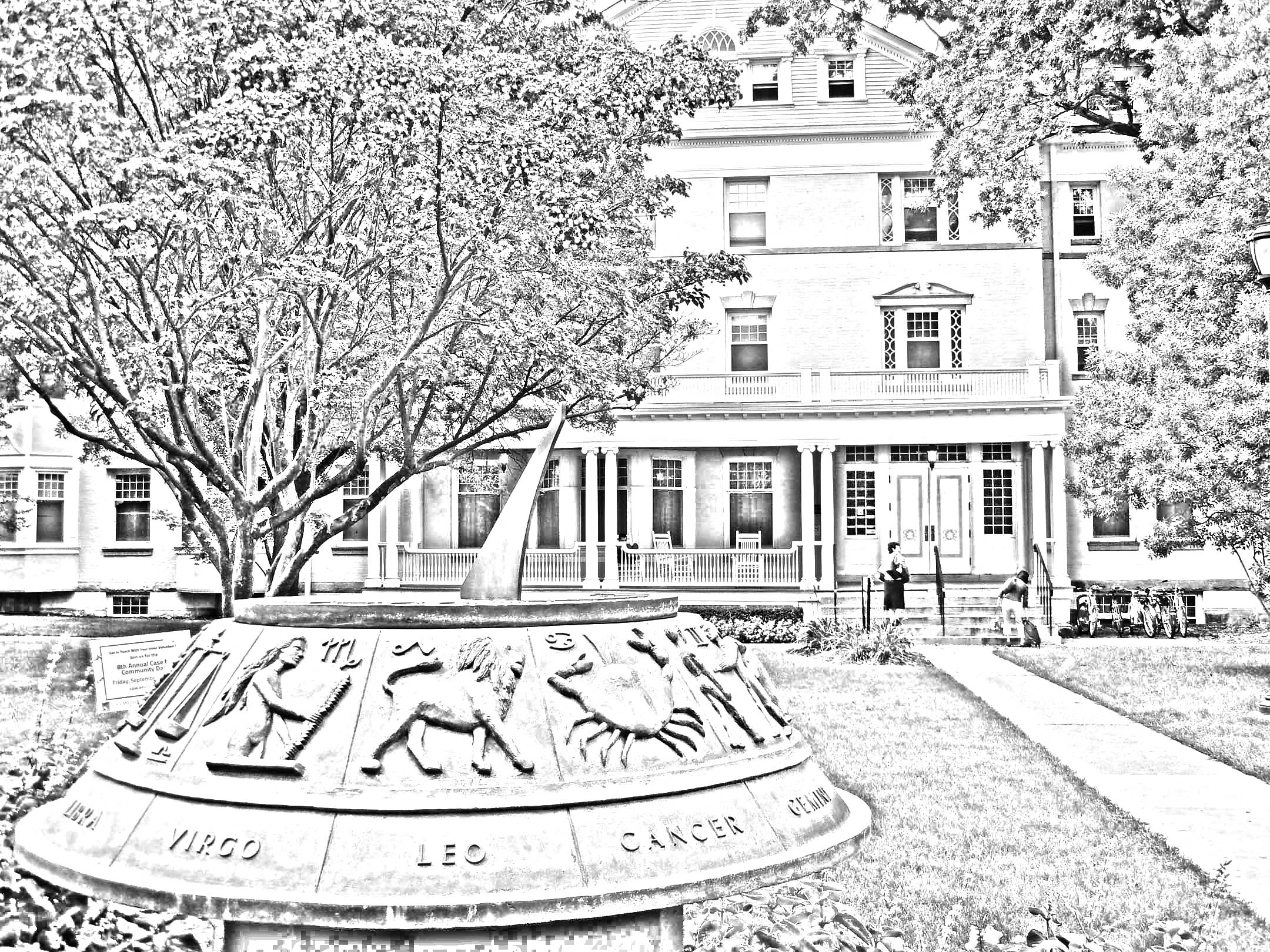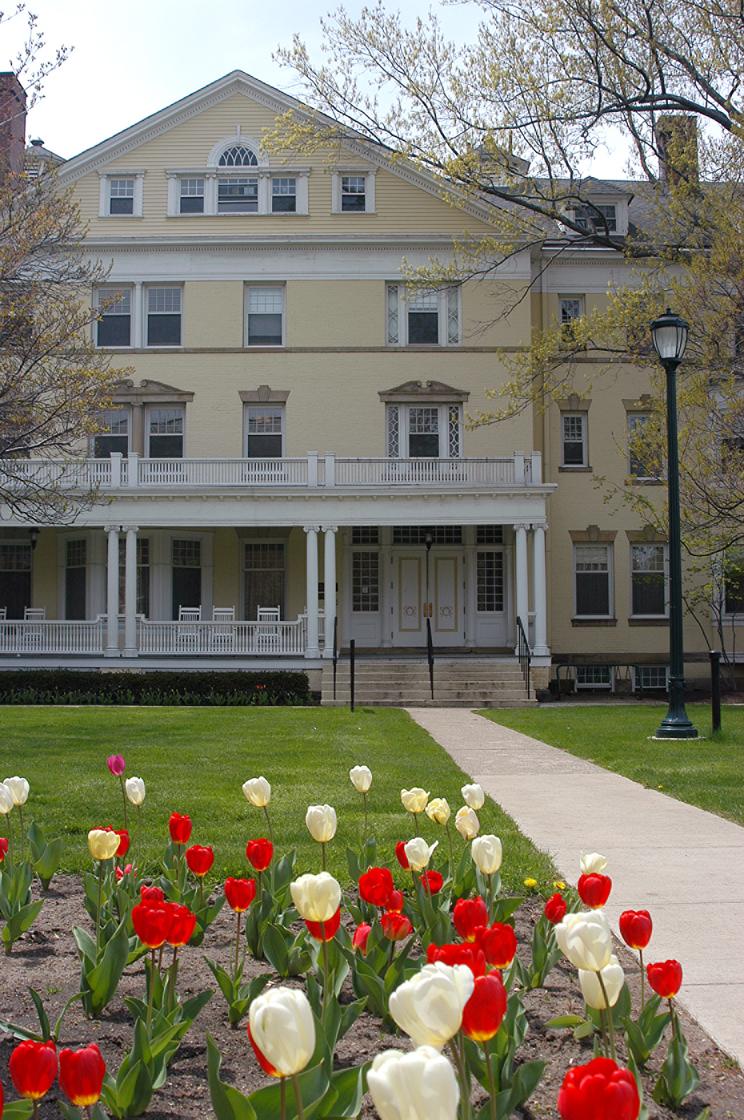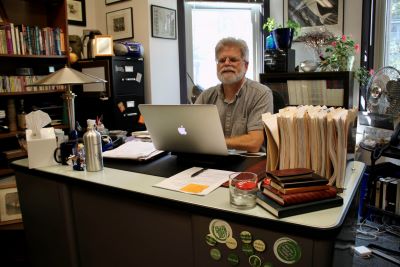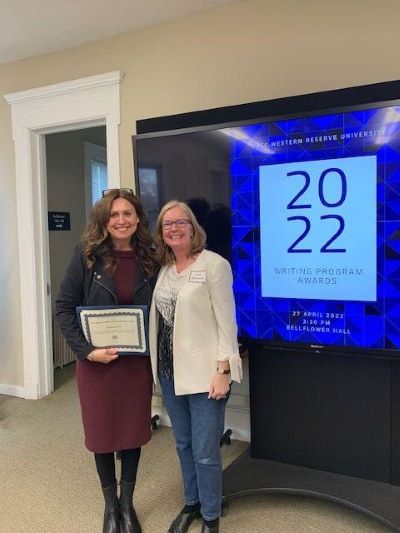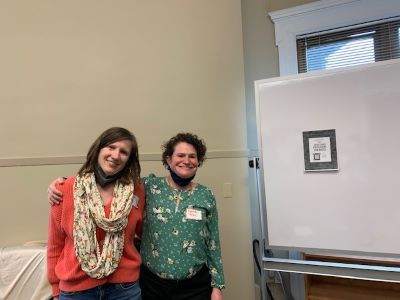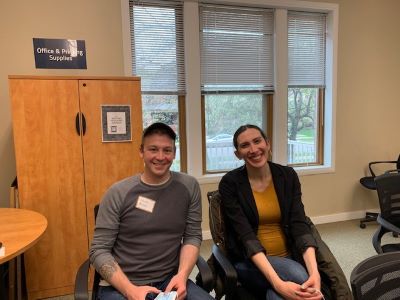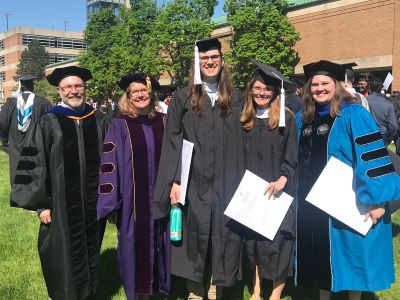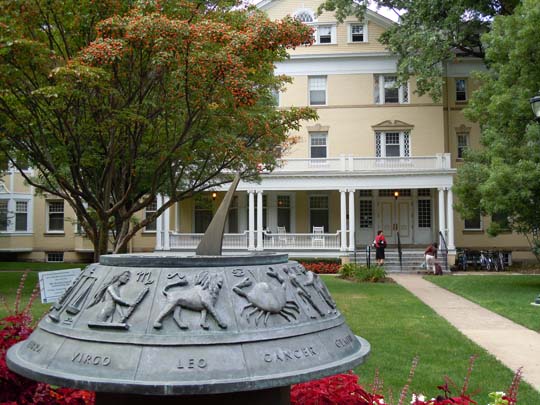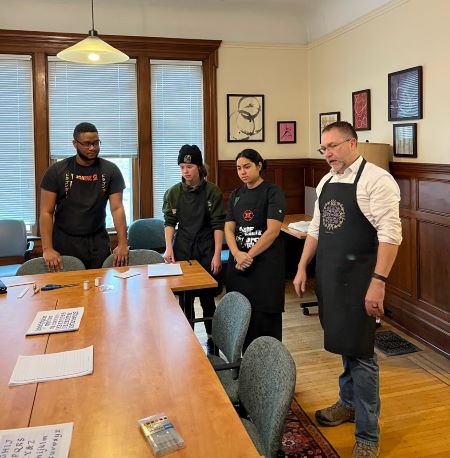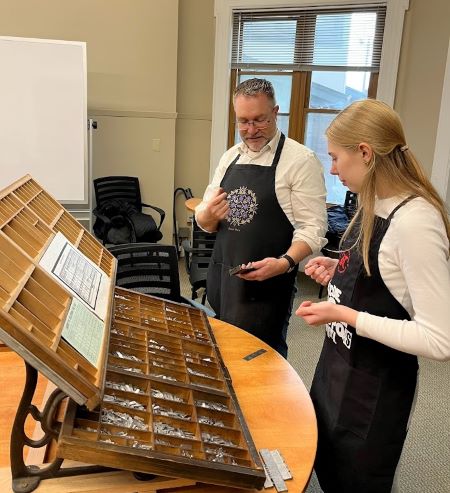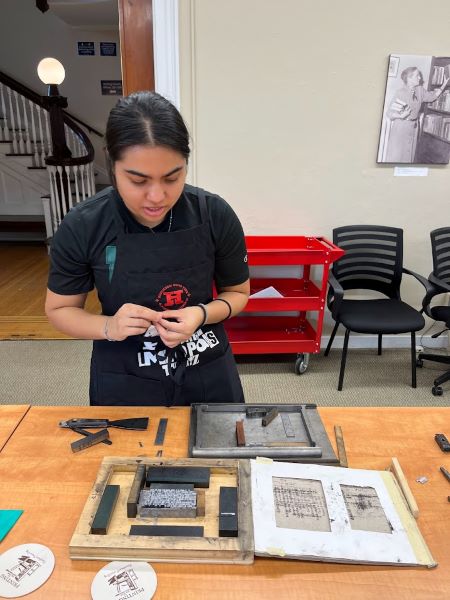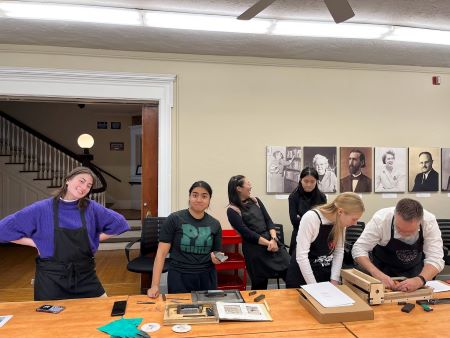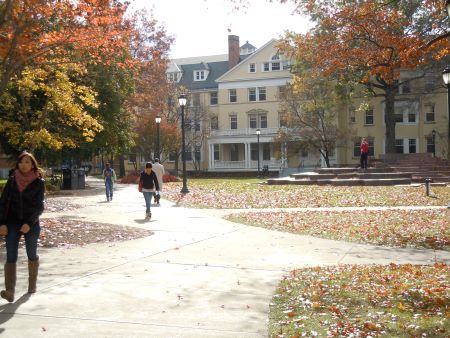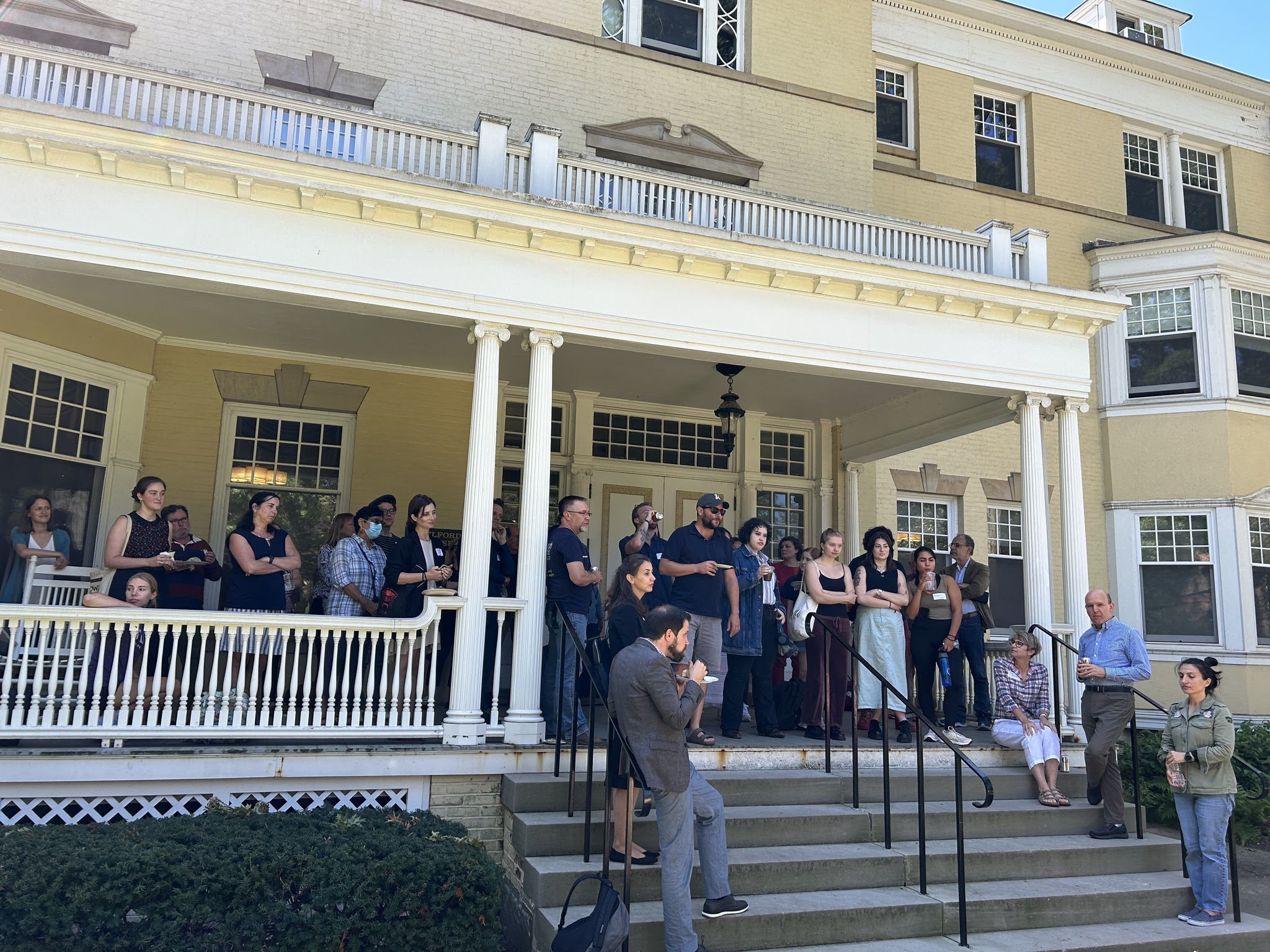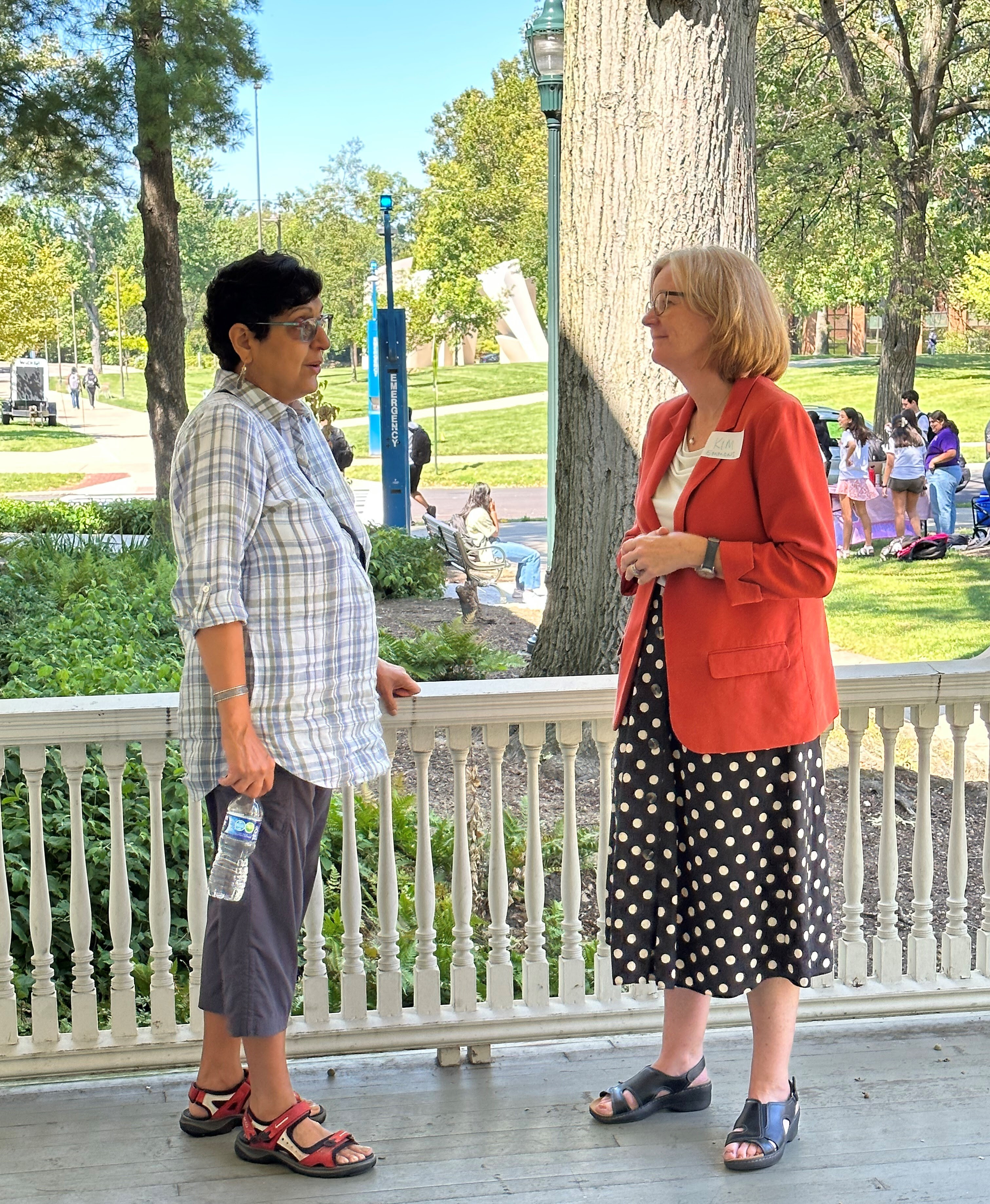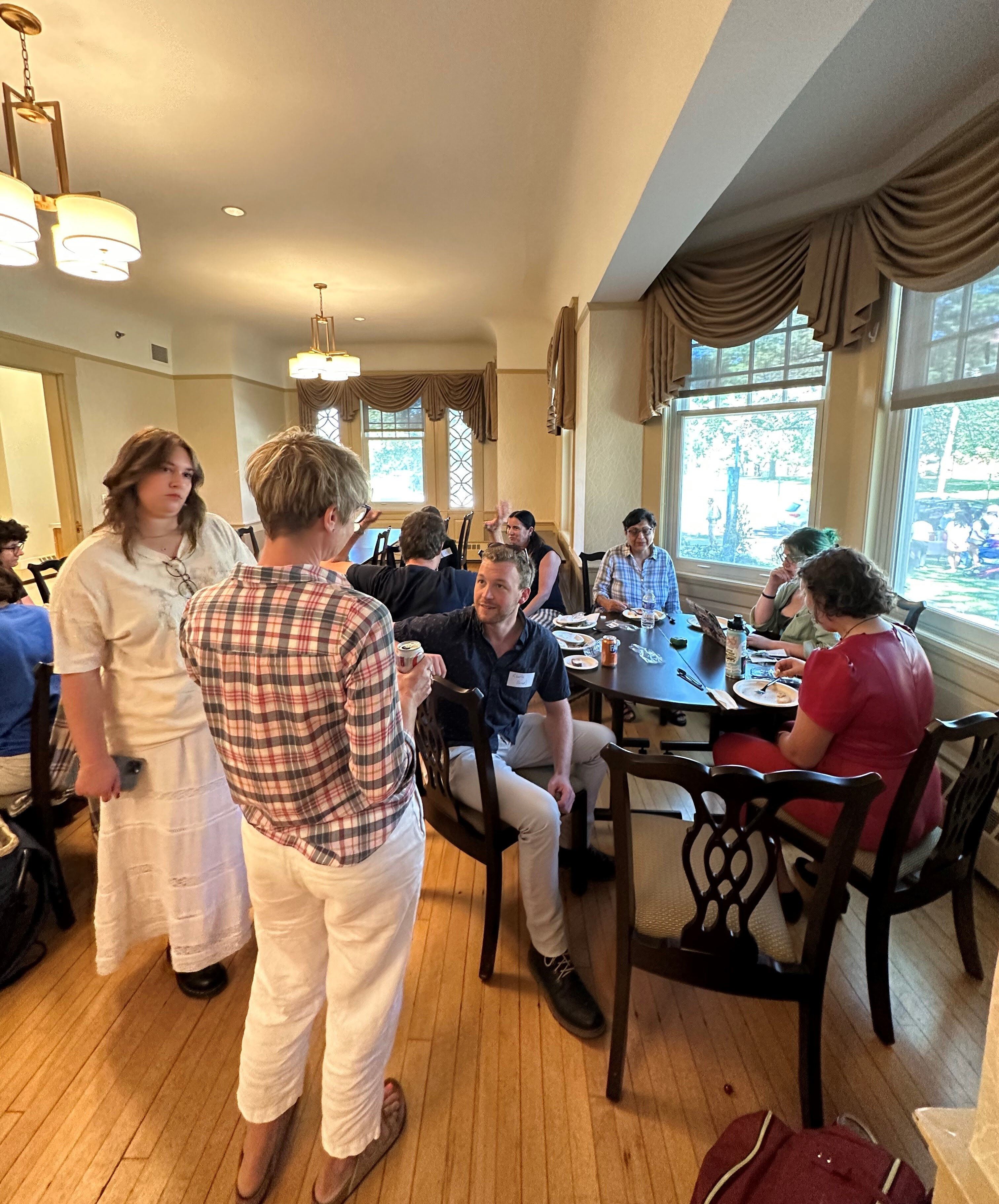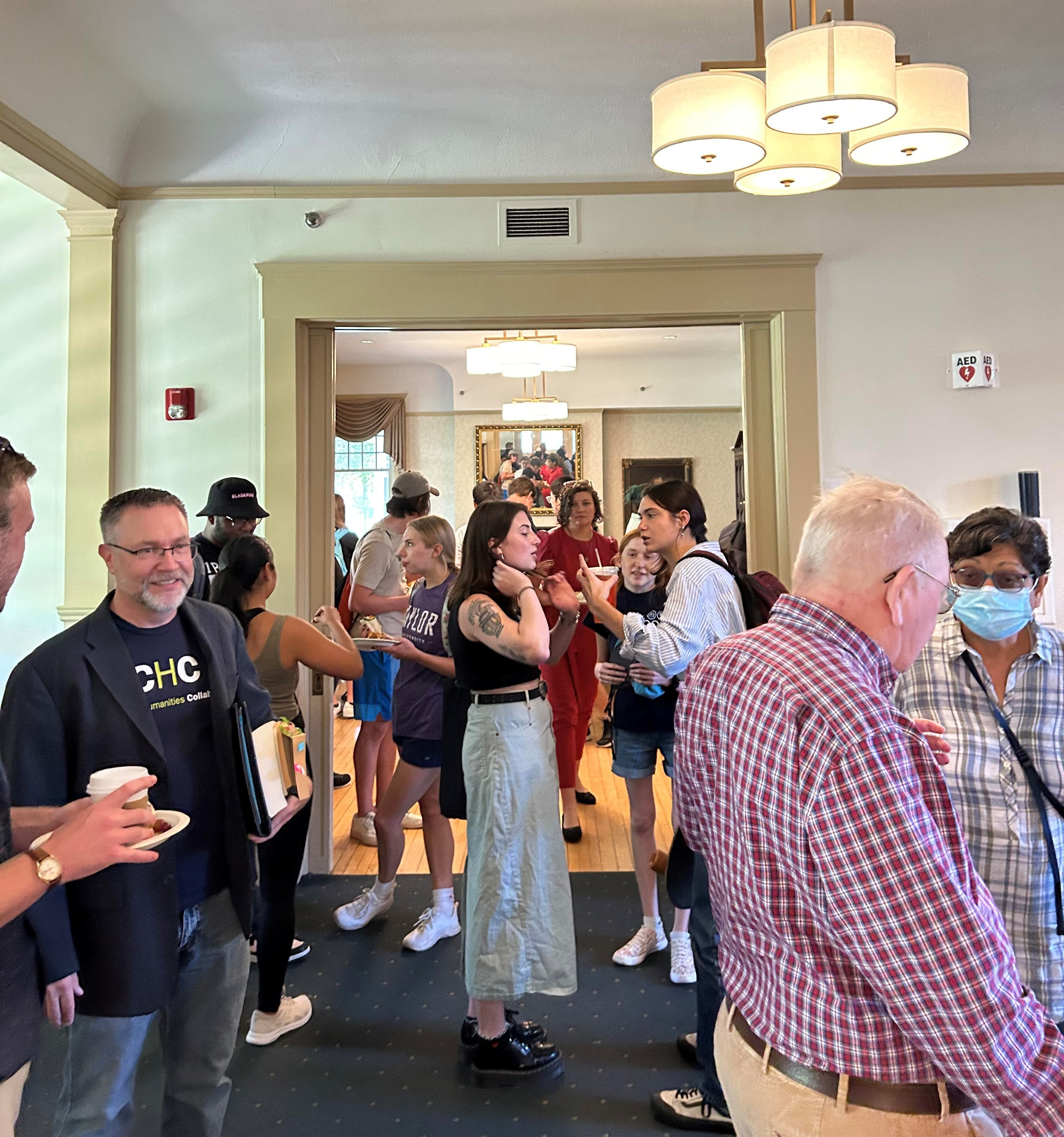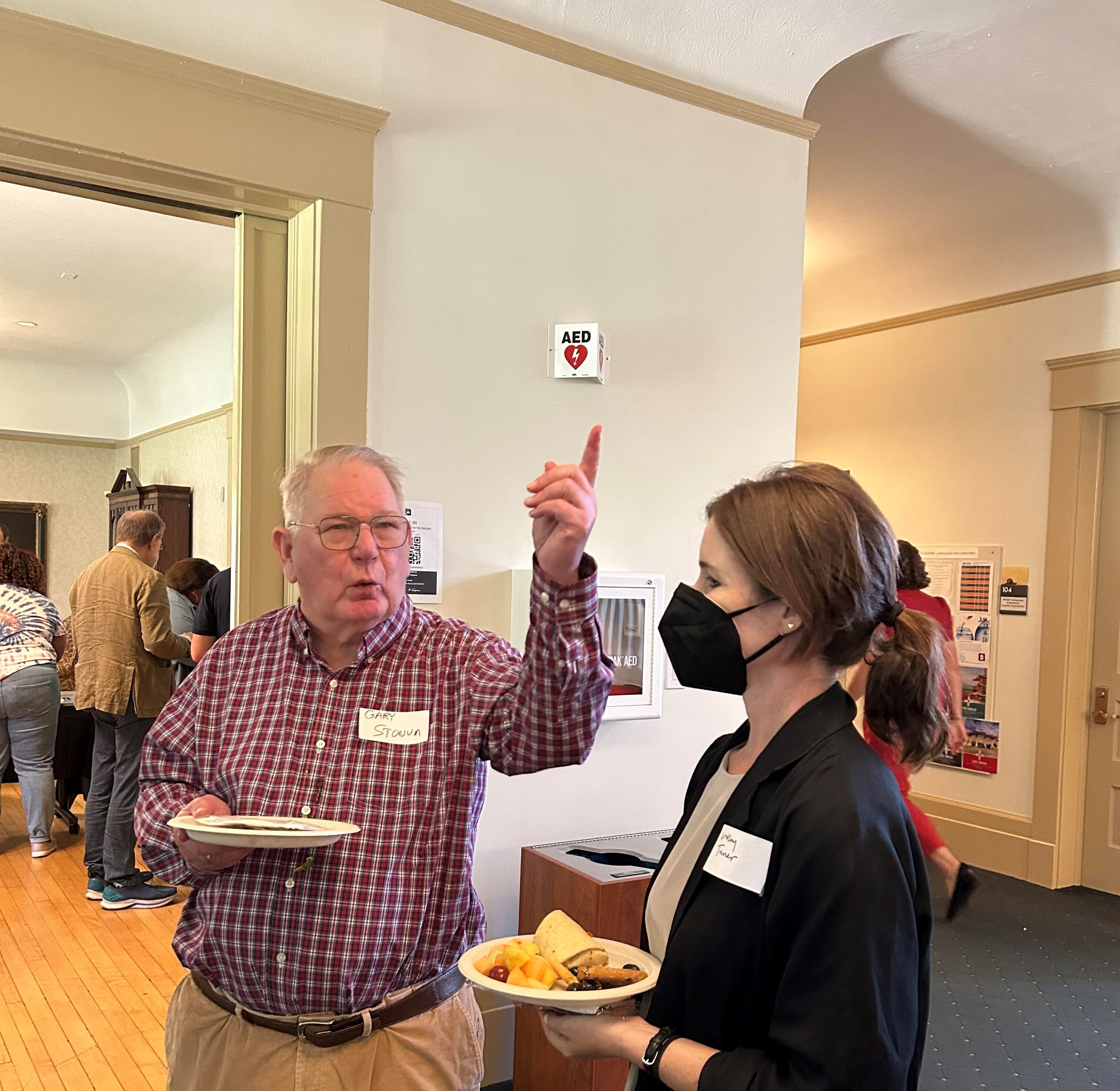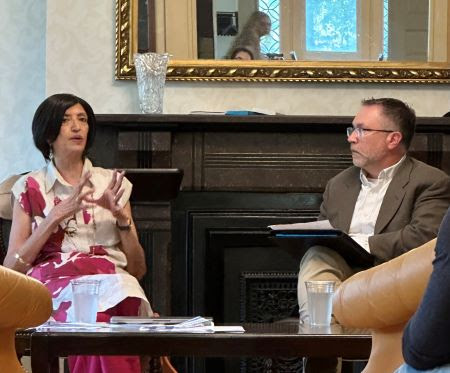in this issue
Siebenschuh’s Retirement/ Faculty: William Powell Jones/Faculty Notes/Undergrad Internships and Travel Grants/Freedman Student Fellowship: H. G. Wells/Alumni News
April to December: Approaching Professor William Siebenschuh’s Retirement, with Prelude & Coda

by John Orlock
Prelude: February, 2018. Late afternoon. The door to my Clark Hall office is open. From the classroom across the hall, I hear the jovial, energetic voice of Professor William Siebenschuh as he holds forth on Canterbury Tales before his undergraduate English class, introducing them to the wit of Chaucer and the wiles of the Wife of Bath. And as he presents Chaucer’s tale, Bill’s account holds the immediacy of an on-line blog about some Hollywood celebrity. At times his teaching style shifts from the relaxed delivery of a skilled standup comic, to the hesitating line of inquiry of Detective Colombo, to the authoritative, patient discourse of a 1950s English professor. For nearly forty years, Bill’s warm, engaging classroom presence has introduced several generations of students to Emma Bovary, Julien Sorel, Robinson Crusoe, and many others: an introduction, also, to the rewards of close reading and connecting with the complex characters of literature.
April 2, 2018. Afternoon. 221 Guilford House. I’m with Bill in his office: an informal interview for an article re his up-coming retirement from CWRU. Sitting in his office is like being in the middle of a three-dimensional collage of personal history: bonsai plants, vines snaking their way along the edges of floor-to-ceiling book shelves stacked with academic tomes; a photo of him playing washboard in an Irish pub band; occasional fish tanks; a plaster death mask of Keats, on which is perched a jaunty red fez; a photo of Bill holding a thirty-pound king salmon. A Stratford Shakespeare Festival poster hangs just above one for The Sopranos. Other shelves behind his desk display several memorable bottles of scotch (empty), a memorable bottle of scotch (half-full), photos of his father, his family, Thomas Hardy. On the front edge of his desk is a life-size plastic rat, its nose clamped by a binder clasp. A whimsical eclectic array of memorabilia, collected with minimal curation across four decades at this university.
Bill leans back relaxed behind his desk, feet propped up on the edge of a pulled-out drawer. In a tattersall button-down shirt and khaki slacks – his usual teaching attire – he conveys the image of an Orvis gentleman at leisure. I ask him about his early years at Case. He tells me he arrived in Cleveland in August 1978 — from Fordham University, where he’d been an assistant professor of English – to assume responsibilities in our Department of English as the new director of composition. “It was a much different university then,” Bill recalls: A contentious merger – the “confederation” – between the two previously autonomous institutions of the Case School of Engineering and Western Reserve College to form Case Western Reserve University had left “scars that were visible and fresh: faculty allegiances still ran deep and feelings were raw… There were tensions between the sciences and the humanities. And these conditions remained for quite a while, more or less until the formation of the College of Arts and Sciences in 1992.”
Another thing he remembers was that in the early 1980s, the freshman class numbered under 600 students, the great percentage of which were from Ohio, versus the national and international demographic of the current student body. But a constant across the years was the high quality of undergraduate and graduate students who attended CWRU: “The good ones (the students) were smart, enthusiastic, and fun.”
In 1985, Bill was appointed Vice Dean for Western Reserve College. Shortly after, he became chair of English, a position he was to hold twice, serving a total of eleven years. During this period, through vicissitudes of faculty dynamics, he was appointed acting chair – simultaneously – for two departments: Art History and Modern Languages & Literatures, a level of departmental oversight arguably unique in University history.
Once stepping down from the Department chair in 2009, he remained in the background as a mentor generous with his time. Mary Grimm – who succeeded Bill as chair:
“Bill talked me into being chair of the department (not quite sure how that happened), but more important, didn’t abandon me when I took it on. He was always there, for a phone call, for an emergency visit in his office, always had good advice about how to go about something, or who in the university to go to for help.”
Although Bill’s academic research centered on Thomas Hardy, Samuel Johnson, and James Boswell, in 2000, his sabbatical leave took him to remote areas of Tibet, where – in collaboration with Case anthropologist Mel Goldstein – he gathered material for three co-authored books dealing with the political, educational, and social change in modern Tibet. Each of these monographs has been published in multiple languages.
Another biographical work, one of which he’s especially proud – Always on My Own: My Life on the Street, co-authored with the subject, James E. “Diz” Long – recounts the memoirs of a professional bodyguard in Cleveland, during the ’60s & ’70s, whose list of clients included such celebrities as Frank Sinatra and Lana Turner.
Four years ago, Bill was named the Oviatt Professor of English, a distinguished professorship whose list of recipients extends back to 1837.
But paralleling his accomplishments as a scholar, administrator, and biographer, was always his love of teaching, and the palpable pleasure he took in guiding discussions of challenging works of literature that dealt with human drama and conflict.
Student quotes reflect Bill’s gift of instilling within his classes – on both the graduate and undergraduate level – confidence to connect on a personal level with great authors – Tolstoy, Flaubert, Swift, Chaucer, Shaw, Stern, and Shakespeare.
“He makes it interesting. After his lectures and stories, the books that we at first had a hard time with began to make sense.”
“Most of the authors we read I’d never heard of… And when we started a new assignment, I always looked forward to Professor Siebenschuh asking us questions about the novels and writers.”
“He stood up there, leaned against the desk and talked to us about Anna Karenina. It didn’t even feel like he was teaching us. He’d just talk to us. About the people in the stories… these characters… And then we’d talk about them. It was neat, really neat.”
“It was because of Professor Siebenschuh’s classes that I became an English major.”
April 30, 2018. 3:05 PM. 210 Clark Hall. The final class of Bill’s forty year’s teaching at CWRU draws to an end. Unknown to him, outside the classroom door a crowd of about 50 people mill about: colleagues, friends, current and former students. They fill the hall and half way down the staircase with the murmur of sotto voce conversations. They’ve come for a surprise “clap out” farewell. After a few minutes, Professor Kim Emmons, organizer of this tribute, enters the classroom, her arms overflowing with a bright bouquet of spring flowers. A few moments later Bill walks into the hallway carrying the bouquet, and the clapping begins. He’s taken by surprise, and the applause continues as he makes his way through the crowded hallway. On and on we applaud. And he moves through the ovation of gratitude – tinged with a certain melancholy sadness – acknowledging the career of an outstanding professor.
He’s at the stairs, and starts down, past a row of students lining the bannister. He reaches the landing, turns. The applause stops in anticipation of what he has to say. “Wow”, he says. And, like a centerfielder who’s just hit a game-winning home run, and pauses before disappearing into the dugout, Bill doffs his Cleveland baseball cap in farewell. “Wow…” Then continues down the last flight of stairs, and out the door. It’s over. And some wonder aloud if this is the twilight of a low-tech era, in which professors such as Bill Siebenschuh thrived: used heart, intellect, and humor to guide students through complexities of the human spirit, as found in an English literature survey course.
Coda: December 28, 2018. 3:30 PM – Bill reflects six months later.
“I was ready to retire when I did and have no regrets. The hardest thing to adjust to has been fully understanding that I’m done. The rhythms of the academic year – first day of classes, teaching schedule, office hours, regular holidays and vacations, final exams, final grades, summers off and then do it all over again in the fall – get into your head after forty-seven years. They don’t go away just because you turn in your keys and parking pass and get your final paycheck. When a big freight train, a hundred cars of coal, gets up to speed, it has so much forward momentum that it takes several miles to bring it to a full stop. Some kind of psychological analogue of that is what I think I’m talking about. It’s going to take me a while.”

Faculty of the Past: William Powell Jones
b. 30 October 1901, Cochran, Georgia
d. 28 July 1989, Cleveland, Ohio

William Powell (“Pete”) Jones graduated magna cum laude with an AB from Emory University in 1921. Following his graduation, he taught English in Himeji, Japan, from 1921 to 1923, an experience that prepared him for three years with Army Intelligence during WWII (1943-1945). Jones completed his AM at Harvard University in 1925 and his PhD there in 1927.
From 1928 to 1930, Jones was an Instructor at Harvard University, before he moved to Cleveland to take up a position as Assistant Professor at Adelbert College of Western Reserve University. He was promoted to Associate Professor in 1938 and Professor in 1947.
Jones served as Dean of Adelbert College from 1947 to 1954, at the end of which time faculties of Adelbert, Mather, and Cleveland Colleges were consolidated. He was named Oviatt Professor and Chair of the English Department of Western Reserve in 1954, with the task of creating a single faculty in English from the consolidated faculties. He served as chair almost to the eve of his retirement (and the federation of WRU and Case Institute of Technology), steering the Department through many challenging years. During his time at WRU, Jones also served as president of several civic organizations, including the Gates Mills Historical Society, the Cleveland Friends of Music, and the Rowfant Club. In recognition of Jones’s distinguished administrative work, the College of Arts and Sciences of CWRU offers a W. P. Jones Fund for the professional development of junior faculty.
Jones lived with his wife Marian on a thirty-acre estate in Gates Mills built by Marian’s father, the noted lawyer and patron of Cleveland arts, Frank Hadley Ginn. The Joneses continued the Ginn tradition of patronage, with significant donations to the collections of the Cleveland Museum of Art. Jones’s own collection of distinguished authors’ letters resides in CWRU’s Special Collections. The Joneses also hosted regular tennis and garden parties for the English Department – occasions commemorated in the verse of Professor Arthur White (1890-1959).
Jones’s key publications began with a monograph on medieval French literature, The Pastourelle: The Origin and Traditions of a Lyric Type (1931).His varied interests, however, eventually manifested in other significant work, such as Thomas Gray, Scholar: The True Tragedy of an Eighteenth-Century Gentleman (1937); James Joyce and the Common Reader (1955); and The Rhetoric of Science: A Study of Scientific Ideas and Imagery in Eighteenth-Century English Poetry (1966).
Following his retirement in 1967, Jones published his autobiography From Georgia to Cleveland (1979). His accounts of the bachelor academic life at Western Reserve are especially lively – brewing beer from “Harvard recipes” during Prohibition in the basement of faculty living quarters on Adelbert Road, for instance.
Jones taught both undergraduate and graduate courses. At Adelbert College in the early 1930s he headed such staple courses as the Survey of English Literature from 1642 to 1800, Great Books, and Poetics and Modern Poetry. After the war and the consolidation of English Departments, Jones continued to teach several incarnations of the Great Books course. In the Graduate School, he taught several courses in Chaucer and in Pope. He supervised at least nine theses and dissertations in his later years.
Entry by Joey Rooney and Kurt Koenigsberger, from records in University Archives, CWRU, and from public documents. Photo courtesy University Archives, CWRU.
FACULTY NOTES
Gabrielle Bychowski has a three-part article in The Public Medievalist.
Cara Byrne presented a paper, “Dismantling Prisons & Building Bridges: Children’s Revolutionary Architecture in Gloria Anzaldúa & Edwidge Danticat’s Picture Books,” at the annual MELUS conference in March.
Michael Clune presented a paper at the MLA in Chicago: “The Idea of Madame Neroni.”
Susan Dominguez presented “The ‘tiny horrors’ of Cultural Genocide: Indigenous Children in Residential and Boarding Schools, 1870-1970” at the Social Justice institute Research Lunch Series in February.
Sarah Gridley has won the 2019 Green Rose Prize for Insofar, which will be published in 2020 by New Issues Press.
Mary Grimm‘s story “Back Then” will appear this summer in The New Yorker.
Josh Hoeynck‘s edited collection, Staying Open: Charles Olson’s Sources and Influences, was published in November.
Caitlin Kelly recently presented a paper, “Reading Pamela after #MeToo and #YesAllWomen,” at the annual conference of the American Society for Eighteenth-Century Studies in Denver.
Kristine Kelly‘s article “Nomadic London: Reading Wandering in Sam Selvon’s The Lonely Londoners and Ben Okri’s ‘Disparities'” just came out in Ariel: A Review of International English Literature (50.1).
Kurt Koenigsberger gave a conference paper at the Modernist Studies Association conference in Columbus in November: “Dynamite in Freshman English: The Battle of the Books at Western Reserve.”
Dave Lucas read at the invitation of Hiram College’s Lindsay-Crane Center in February.
William Marling‘s book Gatekeepers has received a review by Yao Mengze in Comparative Literature & World Literature
Marilyn S. Mobley, vice president for inclusion, diversity and equal opportunity, recently co-wrote a piece for Insight into Diversity: “Fundraising for Diversity Officers: an Overlooked Opportunity.”
James Newlin presented at the 42nd Annual Ohio Valley Shakespeare Conference, October 11-13 in Youngstown. He moderated a panel on “Sleeping, Dreaming, and the Prospect of Belief.”
Brad Ricca edited and wrote the Intro to The Artificial Man and Other Stories, a new collection of stories, some previously unpublished, by Clare Winger Harris, an early feminist science fiction writer who lived in Lakewood in the 1930s.
Martha Schaffer and Michael Householder presented their research on students’ reflective essays at the Seventh International Conference on Writing Analytics in St. Petersburg, Florida, on January 26th. The presentation was titled “The Language of Reflective Essays: What Writing Analytics Can Tell Us About Student Learning.”
Anthony Wexler delivered the Lipman Lecture in Religious Studies at Colby College. The title of the talk was “Israel and the New American Jewish Novel.”
Tim O’Brien Internships and Travel Grants
Funded through generous donations from English Department alumnus Tim O’Brien (‘74), two new competitive financial awards for undergraduate English majors were established in 2018. The Tim O’Brien English Scholarship for Unpaid Internships supports undergraduate English Majors who are participating in an unpaid internship at CWRU or elsewhere. The Tim O’Brien English Research Travel Support Fund offers travel awards to undergraduate English Majors for research projects relating to an English class (such as presenting a conference paper, conducting archival research for a capstone project, visiting a distant museum, etc.).
Sophie Claire Boysko: For presenting a conference paper, “I Rose Up Off the Doctor’s Slab: Fractured Identity in Hedwig and the Angry Inch,” at the Society for Cinema and Media Studies Undergraduate Conference (SCMS-U) at Wilfred Laurier University in Waterloo, Canada
This was the first conference that I have ever attended, and it was an incredible experience. I loved being with so many other undergraduates who were passionate about film. At the time, I was double majoring in Math and English, and I didn’t know what I wanted to do with either major. When I met my roommate from the conference and told her about what I was studying, she asked, “But you’re going to do something with film, right?” I had never really considered film studies as a something that could turn into a career. I already knew that I was passionate about film, but being at the conference made me realize that, not only could I pursue film studies as a career, but I really wanted to pursue it. Now, my plan is to go to grad school and become a professor in film studies, and while I know that it is not easy to become a professor, I feel so happy to have a direction and have a passion realized. It was an incredibly meaningful experience for me. I wouldn’t have been able to attend this conference without my grant from the English Travel Support Fund, and I am so thankful that I was given this opportunity.
Brian Eckert: Community Engagement Internship with the Cuyahoga Valley National Park
Studying English and my education from CWRU helped me in countless ways to secure
the internship and succeed throughout the summer. One of my early projects was to research a
topic with a Ranger to put together a Pop-Up Exhibit. A Pop-Up is a small exhibit that can be
easily set up around the Park with a specific topic for volunteers or Rangers to have impromptu
programs. The goal is to have conversations with visitors, but there’s no time requirement.
My Pop-Up was about the Underground Railroad which had routes through Ohio and the Ohio and Erie Canal. I enjoyed doing the background research and also putting together the exhibit, which included pictures, maps, and dialogic questions. I loved being outside every day, but showing others the value of green space and the outdoors was much more rewarding than hiking alone or clearing trails.
Shivani Govani: Internship at the Northeast Ohio Coalition for the Homeless (NEOCH)
This summer was incredibly rewarding and eye-opening. The internship has taught me the meaning of being a homeless advocate and has given me the opportunity to work on several projects that I hope will lessen the impacts of systematic homelessness in Cleveland. My favorite project was creating a website to assist those experiencing homelessness to reach services. For an entire weekend, I attended an event called “Give Camp” where non-profit companies were able to collaborate with hackers in Cleveland in order to create websites and other applications. We camped out in tents the whole weekend, ate delicious food, and stayed up until 2 A.M. almost every night trying to perfect the website. The website, now known as “#HelpintheCLE” has officially launched and is an amazing resource for those experiencing homelessness. It lists all the medical, shelter, outreach, and legal resources available to homeless individuals along with numerous hotlines and emergency numbers. I am incredibly thankful for my time at NEOCH. In these past three months, I have learned so much about homeless advocacy, social justice, and systematic inequalities. My internship experience has been incredibly fulfilling and I hope to use the knowledge I’ve gained to continue serving my community.
Sarah Parr: Digital Media Intern with Cleveland Scene Magazine
This internship included reporting, pitching ideas, cold calling, interviewing, researching, creating slideshows and more. Studying English helped me secure this internship because the person who interviewed me for it appreciated my years of experience writing and editing, and training in journalism. Overall, this internship proved to be very fruitful. I was asked to do some freelancing for SCENE after my “stellar internship,” as said by SCENE’s Editor-in-Chief. Looking back on my first article and slideshow, I see that my descriptions of events/locations have improved because my researching and HTML skills have increased so much. This funding was able to cover a great deal of my living expenses this summer, which helped me focus on my internship; it gave me the privilege of making the most of all the opportunities working for Cleveland Scene Magazine provided me. Here is the link to my profile on the SCENE site with all my pieces, and a few other links to the slideshows and an event I created: https://www.clevescene.com/cleveland/ArticleArchives?author=18694241
Devina Patel: Georgetown Investigative Internship
My role as an investigative intern at Georgetown Law was very eventful and beyond worthwhile. I learned new skills every day. I was trained by my Investigator supervisor for a week, and then I was assigned two attorneys for whom I worked. Some of the tasks that I completed were going to prison to visit clients, finding witnesses and taking statements from them, watching body-worn camera footage, going to the Metropolitan Police Department Evidence Review Branch to look at evidence that the prosecutors had gathered, serving subpoenas, and much more. This would not have been possible without you, so thank you so very much for your donation!
Freedman Student Fellowship Project: H. G. Wells
Leah Davydov received a Freedman Student Fellowship grant for the 2018-2019 school year to pursue work on creating assets for a digital edition that compares various 1897 editions of H. G. Wells’s The Invisible Man in an attempt to track important textual differences in relation to the text’s print medium. This project is an extension of discoveries Davydov made during the course of a seminar with her adviser Dr. Kurt Koenigsburger. During her coursework, she found that the novel’s original serialization in Pearson’s Weekly Newspaper appeared to contain a number of in-jokes and references indicative of its status as a piece of periodical fiction (e.g., allusions by characters to the story being situated in a newspaper; literary use of ciphers similar to the rebus puzzles that preceded serial segments) and that the novel’s epilogue, which features a character poring over the invisible man’s notes in codex book form, was only added in later printed editions of the text that could be perused in a similar manner by readers.
Davydov is presently working with the Freedman Center’s staff to secure copies of both the original Pearson’s newspaper serial and at least one of the three different 1897 print editions of the novel for digitization. The goal of this initial project will be to create transcripts of at least two variants of the text that have been encoded with XML formatting compliant with the Text Encoding Initiative (TEI) in preparation for an eventual website that will allow users to observe the changes made to Wells’s book over time. In the future, she hopes to expand the project to pursue work on a full digital edition that will compare all four 1897 renderings of the text as well as providing annotations and commentary. She will be presenting the results of her preliminary work during the Freedman Fellows’ annual symposium.
ALUMNI NEWS
Gerry Canavan (’02) has a new book coming out (he’s the editor): The Cambridge History of Science Fiction
Alum (’15) Jason Ray Carney‘s book, Weird Tales of Modernity: The Ephemerality of the Ordinary in the Stories of Robert E. Howard, Clark Ashton Smith and H.P. Lovecraft, will be published in 2019.
William Claspy (BA ’88, MA ’93) is now Head of Special Collections and Archives at CWRU’s Kelvin Smith Library.
Alum (’10) Iris Dunkle‘s biography on Charmian Kitteridge London, Jack London’s wife, will be published by University of Oklahoma Press.
Miriam Goldman (’10) has started a new position as Technical Documentation and Knowledge Manager at Involta.
Alum (’16) Kristin E. Kondrlik‘s article, “Caroline Matthews’s Experiences of a Woman Doctor in Serbia (1916): Advocacy for Women Doctors in Early Twentieth Century War Writing,” will be published in English Literature in Transition, 1880-1920.
Marie Lathers (’15) has a story in Flash Fiction Magazine.
Jamie McDaniel (’10) received the CEA Joe D. Thomas Distinguished Service Award at the 50th Annual CEA Conference in New Orleans.
Jess Slentz (’17) has accepted the position of Director of Sponsored Programs and Faculty Research at Nazareth College in Rochester, New York. She will be creating initiatives for and supporting undergraduate research on campus and doing faculty development and mentorship, particularly for junior faculty developing projects and seeking funding.
Jess Walters (’08) has accepted a position as CEO of Big Brothers Big Sisters of Greater Cleveland, starting December 27.
SEND US YOUR NEWS
If you have news you would like to share in a future newsletter, please send it to department chair Christopher Flint (cxf33@case.edu).
The department also has a Facebook page on which several hundred of your classmates and profs are already sharing their news. Just use your Facebook locator to find “CWRU English Department” and see what they’ve been up to. Become a member of the community and post your own news. We want to know. The department will be posting here regularly too—news of colloquiums, readings, etc.
The post Department of English Newsletter: March 2019 appeared first on Department of English.










 If you have news you would like to share in a future newsletter, please send it to department chair Christopher Flint (cxf33@case.edu).
If you have news you would like to share in a future newsletter, please send it to department chair Christopher Flint (cxf33@case.edu).
















